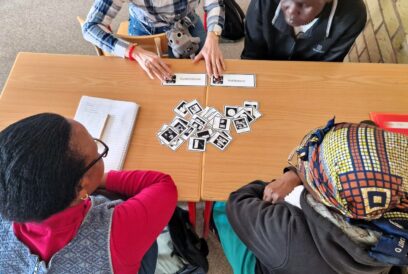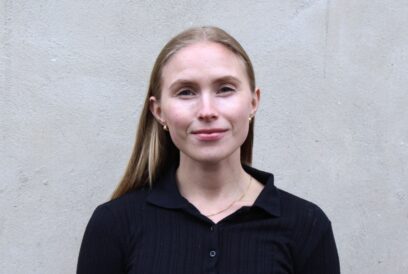

Alice Stollmeyer works at the intersection of freedom, security and technology, building civil resilience against the so-called hybrid threats to democracy.
Alice Stollmeyer works at the intersection of freedom, security and technology, building civil resilience against the so-called hybrid threats to democracy.
In the era of disinformation, we need to learn completely new behaviour models, argues demoracy activist Alice Stollmeyer.
When Alice Stollmeyer first started working as an independent consultant in Brussels, her focus was on advocating more sustainable energy and ambitious climate policies in the European Union.
With a background in science communications, Stollmeyer quickly became active on Twitter, finding it a good platform to highlight policy points and ask critical questions directly of those holding political power.
Then she started tweeting about Russia.
“It was around 2014, when Russia was invading Crimea in Ukraine, and I got more interested in its geopolitics. That’s when the Russian trolls found me on Twitter,” Stollmeyer says.
The trolls and bots meant to silence Stollmeyer, but instead she started reading more about new forms of propaganda, algorithms and paid campaigns on social media – things that were just starting to become hot topics.
“Even if we could stop all foreign propaganda and become rational actors, as long as big tech companies have polarisation as their business model, this problem is not going anywhere.”
The more she learned, the more she wanted to get involved and do something to fight these new threats that were mostly taking shape online. In 2017, Stollmeyer decided to start a new organisation, Defend Democracy.
Hybrid threats constantly taking on new forms
Defend Democracy operates at the intersection of freedom, security and technology, building civil resilience against the so-called hybrid threats to democracy.
‘Hybrid threats’ is a term that has become increasingly popular in the recent years. Generally, it refers to a mix of conventional and unconventional tactics or activities, such as disinformation, cyberattacks or economic pressure.
“A hybrid threat is difficult to define as things keep changing so fast. But it can be seen as anything designed to undermine social cohesion, create unrest and feed polarisation,” Stollmeyer explains.
Right now, it is painfully obvious how state actors can disrupt and exploit our information sphere. But Alice Stollmeyer wants to highlight that states behaving badly are just one part of the problem. More than anything, she is concerned about the role of digital companies in democracy.
“When I started working in Brussels, the biggest lobbying groups were around fossil fuel. Now, big tech company lobbyists have actually taken over.”
Social psychology should be a part of any curriculum around media or digital literacy.
“Even if we could stop all foreign propaganda and become rational actors, as long as big tech companies have polarisation as their business model, this problem is not going anywhere.”
Stollmeyer refers to the well-studied fact that the way social media companies operate is very much based on amplifying differences and extreme views.
Understanding our own behaviour comes first
In the era of disinformation and with the ever-growing power of tech companies, what role can education play in standing up for democracy?
One of the key issues, Stollmeyer believes, revolves around psychology. Our brain was not built for an environment where we are constantly being bombarded with information. It is very difficult to “act rationally” in the broken information sphere we are experiencing.
In other words, teaching facts about fake news is not enough since we need to learn completely new behaviour models. To do that, Alice Stollmeyer believes that people first need to become aware of and better understand their own behaviour.
“One aspect of doing this could be some sort of mindfulness training. And social psychology should be a part of any curriculum around media or digital literacy – group psychology, for example, plays a big part in our online behaviour,” she says.
As the changes in online and digital technology have been so quick and overwhelming, it is also hard to pinpoint how they are affecting our lives.
One important task for education is to find ways of making the impacts tangible and visible. Data privacy is a good example, Stollmeyer points out – in Europe it might be easy not to pay too much attention to it, as our data is still relatively protected compared to many other countries.
“But in the US, for example, many people now have to worry about the consequences of googling abortion services in areas where abortion is no longer legal. Can their searches be tracked and used against them?”
Alice Stollmeyer stresses that individuals cannot solve the problem of information disorder on their own. We also need more awareness and education on how to hold governments accountable for ensuring safe and fair use of digital and technological services.
“As with climate change, if governments don’t feel the pressure from people, they will be slow, listen to the big tech lobbyists and water down important initiatives,” Stollmeyer argues.
Directly pressuring big tech, she continues, is difficult, as they already hold so much power. But initiatives such as shareholder activism and collective lawsuits have shown promising signs as effective civil advocacy.
Don’t feed the algorithm
The work of Alice Stollmeyer’s own organisation, Defend Democracy, ranges from convening high-level democracy stakeholders, to community building and training practitioners.
The feeling is that, in addition to better regulation and collective countermeasures, we also need better civil resilience to tackle information disorder.
One of the Defend Democracy projects, Act on Disinfo training, was originally developed for communications professionals. It offers tangible tools for dealing with information manipulation, disinformation, conspiracy theories, propaganda and other harmful information activities.
As an effective strategy for anyone wanting to reduce disinformation or propaganda online, Stollmeyer offers a simple reminder: don’t feed the algorithm.
“For example, when Trumps was still on Twitter, my whole feed was full of people either responding to him or quoting his tweets. Even if the comments were negative, they were still feeding the algorithm and amplifying Trump’s message,” she says.
Democracy Drinks, which Stollmeyer also developed, is a different approach to the work. The idea is that every month, democracy advocates, thinkers and other active citizens meet up at informal networking events to catch up, test ideas and support each other.
The event concept has already been adopted by ten cities across the world.
“One thing hybrid threats have in common is that they are dividing us. That’s why it felt so important to bring people from different viewpoints and professional silos together. We also need to focus on building connections and social cohesion in the offline world.”
Author







